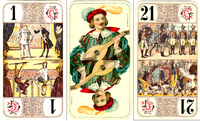French Tarot
| A trick-taking game of the European tarot card game family | |

The 3 oudlers of the French Tarot Nouveau, circa 1910
|
|
| Origin | French |
|---|---|
| Alternative names | Tarot, Jeu de tarot |
| Type | Trick-taking |
| Players | 4 Variants for 3 or 5 players |
| Skills required | Card Counting, Tactics, Strategy |
| Age range | 12 and up |
| Cards | 78 |
| Deck | Tarot Nouveau |
| Play | Counter-clockwise |
| Card rank (highest to lowest) | Trump suit 21–1, Excuse R D C V 10 9 8 7 6 5 4 3 2 1 |
| Playing time | 15 minutes per hand |
| Random chance | Moderate |
| Related games | |
| Scarto, Troccas | |
The French game of tarot, also jeu de tarot, is a trick-taking strategy tarot card game played by three to five players using a traditional 78-card tarot deck. The game is the second most popular card game in France, and also known in French-speaking Canada. French tarot is one of the older forms of tarot and has remained popular for centuries.
Tarot, the second-most popular card game in France, trailing only Belote, has been gaining popularity since the latter part of the 20th century, helped largely by the fact that the rules are very consistent wherever the game is played. The Fédération Française de Tarot publishes official rules for tarot. In English, the game is sometimes referred to as French tarot. This is done to differentiate the card game from other uses of the tarot deck which are more familiar in the Americas and English-speaking countries, namely cartomancy and other divinatory uses, and also to distinguish it from other card games played with a tarot deck.
The game of tarot is played using a 78-card tarot deck. This deck is composed of:
Historically, this game was played with the Italian suited Tarot of Marseilles deck which lacked reversible face cards and trumps and corner indices. In modern times, for ease of play, a deck style known as the "Tarot Nouveau" or "Bourgeois Tarot" is used to play the game. This deck, which began to appear around the late 19th century, uses French suits and replaces the traditional Renaissance allegorical images of the atouts with depictions of typical fin de siècle genre scenes of French life and leisure.
Three cards known as ("honors") are of particular importance in the game: the 1 of trumps (le or "Little one"), the 21 of trumps (le or "The World", a holdover from the name of this card in the Tarot of Marseilles), and the Excuse (the Fool). These cards, when captured by the high bidder, lower the point threshold needed to fulfill the contract. In colloquial French, oudlers are often referred to as bouts (ends).
...
Wikipedia
